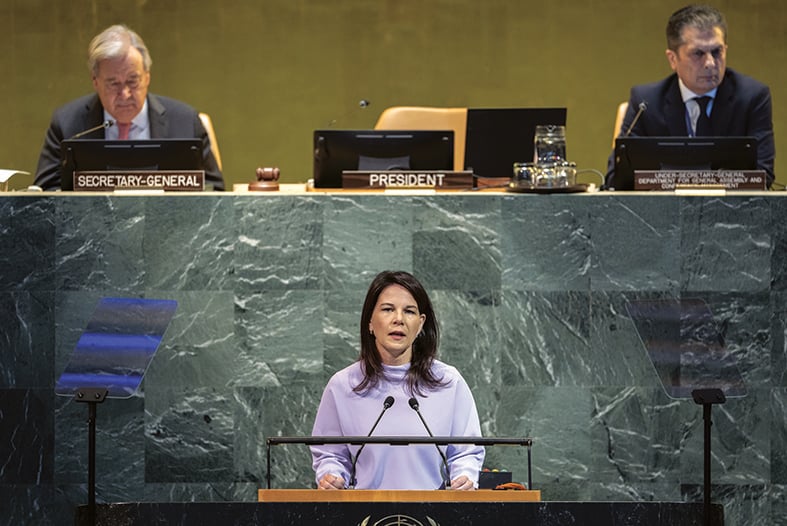Analysis
Palestine has become a central subject at the United Nations
Four of the five permanent Security Council members now recognize Palestine, highlighting the growing rift between Washington and a coalition of European and Arab countries. Palestine has become a test case for the future of the multilateral system.

The 80th UN General Assembly began in New York on Monday, at a moment of extreme weakness for the United Nations and intense international pressure.
With global crises ranging from the wars in Gaza and Ukraine to the fight against climate change, gender inequality and the ethical dilemmas posed by artificial intelligence, the event taking place this week will be of greater consequence than a mere recurring tradition.
The session opened with the theme of “Better Together: 80 Years and Beyond for Peace, Development, and Human Rights,” emphasizing the institution's importance even as it finds itself under attack, hosted in a nation once again led by Donald Trump, who has never hidden that if it were up to him, he would dissolve it at the stroke of a pen.
“We are meeting in turbulent, even uncharted, waters,” stressed UN Secretary-General António Guterres in his opening address. “Geopolitical divides are widening. Conflicts rage. Impunity is rising. And international cooperation is being tested by pressures unseen in generations.” But he also added that the gathering of nearly 150 global leaders remains, especially now, “an opportunity we cannot afford to miss.”
In the end, Monday belonged to Palestine. On Sunday, countries historically close to Israel – including the United Kingdom, Canada, Australia, and Portugal – had announced their recognition of the state of Palestine, a move that came on the eve of the International Conference for the Peaceful Resolution of the Palestinian Question and the Implementation of the Two-State Solution, aligning them with the majority of Assembly member states. The conference, at the initiative of France and Saudi Arabia, is perhaps the most significant diplomatic occasion since the Oslo Accords, though Palestine's recognition as a full UN member state remains highly unlikely, as it requires the approval of the Security Council, where a U.S. veto is a foregone conclusion.
“Some will say this is too late. Others, that it is too soon. But one thing is certain: we cannot wait any longer,” French President Emmanuel Macron said at the opening of the conference, recalling the failure to create a Palestinian state in 1947-48, when only Israel gained statehood, in violation of the partition plan of the fledgling UN. “For this reason, today I declare that France recognizes the State of Palestine.”
These bilateral recognitions are a powerful signal, especially the U.K.’s, given its central role in the region's history. In 1917, the British government’s Balfour Declaration supported the establishment of a “national home for the Jewish people” in Palestine, a policy enacted during the British colonial mandate. Without London, the State of Israel would likely not have been born.
With the formal announcements from the U.K. and France, four of the five permanent Security Council members now recognize Palestine, highlighting the growing rift between Washington and a coalition of European and Arab countries. Palestine has become a test case for the future of the multilateral system. The Trump administration, an increasingly isolated giant, has denied visas to some 80 Palestinian officials, including President Mahmoud Abbas, in violation of the 1947 Host Country Agreement obliging the U.S. to grant access for UN activities. For its part, Israel, speaking through its UN ambassador, Danny Danon, called the conference a “circus” that “rewards terror.”
The highest bodies of international law are also in the crosshairs. The United States is reportedly considering imposing sanctions this week on the entire International Criminal Court in retaliation for its investigation into Israeli war crimes – a move that would jeopardize the Court’s operations. Until now, Washington had imposed targeted sanctions on individual prosecutors and judges, but had never taken aim at the Court itself.
A week of protests is planned outside the UN headquarters – with the most anticipated one being set for Friday, when Israeli Prime Minister Netanyahu is scheduled to speak. Still, Philippe Lazzarini, the Commissioner-General of the UN agency for Palestinian refugees (UNRWA), stressed that the recognition of Palestine, “while welcome,” “does not mean much if there is no ceasefire.”
Originally published at https://ilmanifesto.it/allonu-e-il-palestine-day on 2025-09-23
